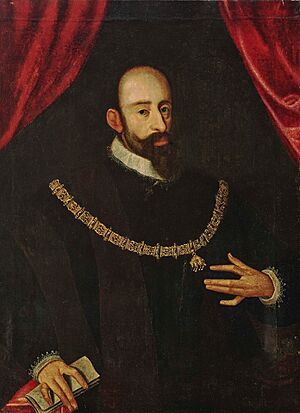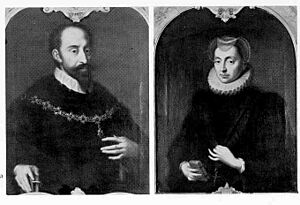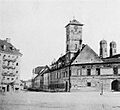William V, Duke of Bavaria facts for kids
Quick facts for kids William V |
|
|---|---|

William V of Bavaria wearing the insignia of the Order of the Golden Fleece
|
|
| Duke of Bavaria | |
| Reign | 24 October 1579 – 15 October 1597 (abdication) |
| Predecessor | Albert V |
| Successor | Maximilian I |
| Born | 29 September 1548 Landshut |
| Died | 7 February 1626 (aged 77) Schleissheim Palace |
| Burial | St. Michael's Church, Munich |
| Spouse | Renata of Lorraine |
| Issue | Maximilian I, Elector of Bavaria Maria Anna, Archduchess of Austria Philipp William, Bishop of Regensburg Ferdinand of Bavaria Karl of Bavaria Albert VI of Bavaria Magdalene of Bavaria |
| House | Wittelsbach |
| Father | Albert V, Duke of Bavaria |
| Mother | Anna of Austria |
| Religion | Roman Catholicism |
William V (born September 29, 1548 – died February 7, 1626) was known as the Pious. He was the Duke of Bavaria from 1579 to 1597. He was a strong supporter of the Catholic Church and spent much of his life focused on his faith.
Contents
Early Life and Education
William V was born in Landshut. His parents were Albert V and Archduchess Anna of Austria.
He received a special education from the Jesuits. This education made him very dedicated to the Catholic faith. People called him 'the Pious' because he spent a lot of time praying and attending church services. He also took part in public religious events and pilgrimages.
When he was a young prince, William V lived at Trausnitz Castle. He spent many years, from 1568 to 1578, making big changes to the castle. He added new parts, turning the old Gothic castle into a beautiful Renaissance palace.
Duke of Bavaria
Like his father, William V strongly supported the Counter-Reformation. This was a movement within the Catholic Church to strengthen it. He worked to make sure his family held important church positions.
Supporting the Church
In 1583, William helped his brother Ernest become the archbishop of Cologne. This was a very important position. Another brother, Ferdinand, led the Bavarian army to help secure this role. The family kept control of this important church position for almost 200 years.
Two of William V's sons also became important church leaders. Philipp Wilhelm became a Bishop of Regensburg and later a Cardinal. Ferdinand became the Archbishop of Cologne, just like his uncle.
William V made sure that only Catholics lived in Bavaria during his rule. He created a special church council called the Geistlicher Rat. This council advised him on religious matters. It also made sure that Catholic clergy and state officials followed church rules. The council helped fund new Catholic schools and religious groups.
Royal Gifts and Buildings
In 1582, William V gave a special gift to Archduke Ferdinand II. It was a unique Trumpeter Automaton. This was a mechanical toy with five trumpeters and one drummer. It was made by skilled craftspeople in Augsburg.
William V also spent a lot of money on building projects for the Church. He built the Jesuit St. Michael's Church and a college in Munich. These buildings were important centers for the Counter-Reformation.
His spending on these projects was very high. It caused financial problems for Bavaria. In 1597, William V decided to step down as Duke. He gave the rule to his son, Maximilian I. After that, William V lived a quiet life in a monastery. He spent his remaining years in prayer. He passed away in 1626 at the Old Schleissheim Palace. He was buried at St. Michael's Church in Munich.
Cultural Activities
William V loved art and culture. Even as a young prince, he supported artists. His court architect, Friedrich Sustris, helped him decorate Trausnitz Castle. Later, Sustris also worked on the Munich Residenz and other buildings in Munich. These included the Wilhelminische Veste and St. Michael's Church.
In 1589, William V started the famous Hofbräu Brewery.
He also founded the Old Schleissheim Palace in 1598. This was a country house and a quiet retreat near Dachau Palace. William V invited many talented artists to his court. These included sculptors like Hans Krumpper and Hubert Gerhard. Painters like Peter Candid and Hans von Aachen also worked for him.
Family Life

William V married Renata of Lorraine in Munich on February 22, 1568. They had several children:
- Christoph (born and died in 1570).
- Christine (1571–1580), who died young.
- Maximilian I (1573–1651), who became the next Duke and Elector of Bavaria.
- Maria Anna of Bavaria (1574–1616), who married Ferdinand II, Holy Roman Emperor.
- Philipp Wilhelm (1576–1598), who became a Bishop and a Cardinal.
- Ferdinand (1577–1650), who became the Archbishop and Prince-Elector of Cologne.
- Eleonore Magdalene (1578–1579), who died as a baby.
- Karl (1580–1587), who died in childhood.
- Albert VI (1584–1666).
- Magdalene of Bavaria (1587–1628).
Images for kids
See also
 In Spanish: Guillermo V de Baviera para niños
In Spanish: Guillermo V de Baviera para niños


